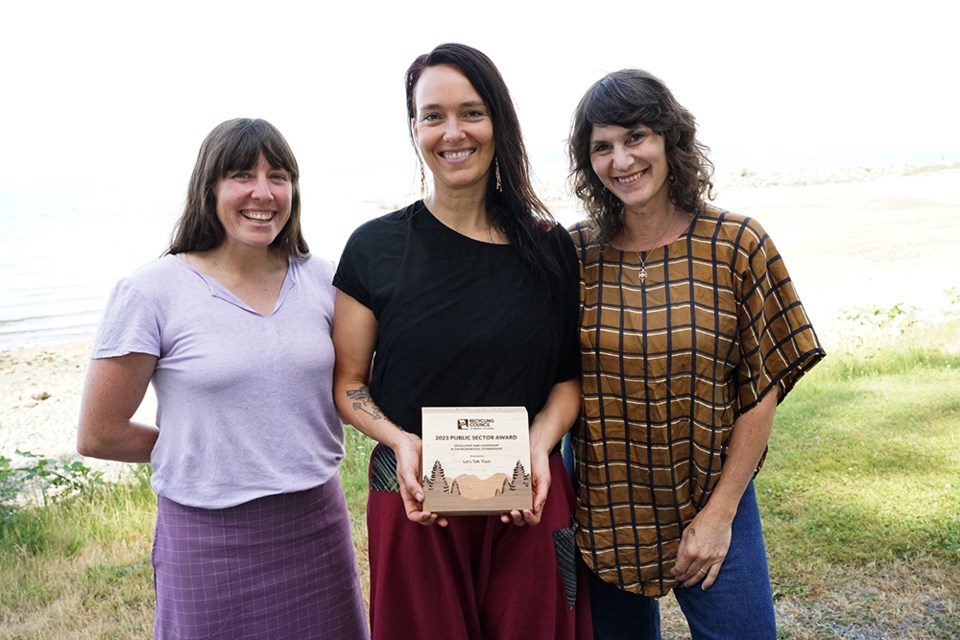qathet Regional District’s (qRD) Let’s Talk Trash team has been recognized by the Recycling Council of British Columbia for its excellence in working to educate the public about solid waste reduction and solutions.
Since 2011, the team has been contracted by qRD to deliver its waste reduction education program.
Team member Abby McLennan said there were four different awards given out by the recycling council and Let’s Talk Trash was awarded for its work in the public sector.
“It’s an award for excellence and leadership in environmental stewardship,” said McLennan.
She said a member of the Recycling Council of BC nominated Let’s Talk Trash.
McLennan said winning the award really warms the hearts of the team after 12 years of working in the field.
“It really means a lot,” added McLennan.
Team member Tai Uhlmann said the recycling council is a prominent organization in BC.
“They’ve hosted conferences we’ve gone to and they host the recyclepedia app, which shows where things are recyclable,” said Uhlmann.
The app helps people find more than 1,000 drop-off locations and recycling options for more than 70 materials or products across BC.
“They are an amazing provincial resource, so it’s a pretty big honour to be recognized by an organization of that calibre,” she added.
Uhlmann said the recycling council also collects statistics around materials that are recycled and what questions people have.
“They are a significant institution in the solid waste environmental community for British Columbia,” said Uhlmann.
McLennan said qRD is a member of the provincial recycling council. She said Let’s Talk Trash was formed in response to a request for proposals in 2011 from the regional district for a solid waste education program.
“Many of the initiatives we still have going today, like zero waste events, focusing on composting, workshops, public outreach and education,” said McLennan. “Those original initiatives we put together in 2011, we are still doing. It seems like we had really good vision back then that is still relevant today.
“We’ve really spread our wings outside of the public education realm, getting into operations and logistics, and helping regional district staff with different elements of solid waste.”
Resource recovery
Uhlmann said the team contributed to the solid waste management plan, which helps determine where the community will go with solid waste over the next 10 years. The team has been involved in the resource-recovery centre and waste-transfer station currently under construction at the old City of Powell River waste transfer site above Willingdon Beach campsite.
“One of the key priorities outlined in the solid waste management plan was to have a resource-recovery centre, so we are trying to keep to that vision and ensure we have a local facility that has the three pillars of sustainability,” said Uhlmann. “We want to have the environmental, economic and the social piece at that facility and we really want it to be a hub for the community, as well as a way to save money on disposal and to increase diversion opportunities.”
Let’s Talk Trash team members have toured a number of facilities in towns outside of the qathet region and brought back best practices from those facilities for qRD’s facility.
“We are not reinventing the wheel; we are taking best practices from facilities that are doing amazing things,” said Uhlmann. “We are updating and improving our practices and taking it into the future. We are really focused on the diversion piece for the local secondary economy. How do we make these materials available from the waste stream to local entrepreneurs, artists and other people that want the material?
“Our site will focus on that diversion more than other facilities, where the material goes in a bin and it goes away. We are trying to take it out of the waste stream before it goes in a bin and make it available.”
McLennan said the regional district, in administering the resource-recovery centre, will try to push the current envelope in pulling material out of the waste stream. She said the regional district received $1 million in a grant and there will be focus on diversion infrastructure.
Moving forward, efforts will be made to bring qRD as close to zero waste as possible. McLennan said it is a vision and a goal, and Uhlmann added that it will be done over time.
“I don’t want the expectation to be when the doors open, people can divert everything,” said Uhlmann. “There is a responsibility on people to consume less and take responsibility. We are not going to recycle our way out of this, but we will be able to create more opportunities for people than we currently have.”




